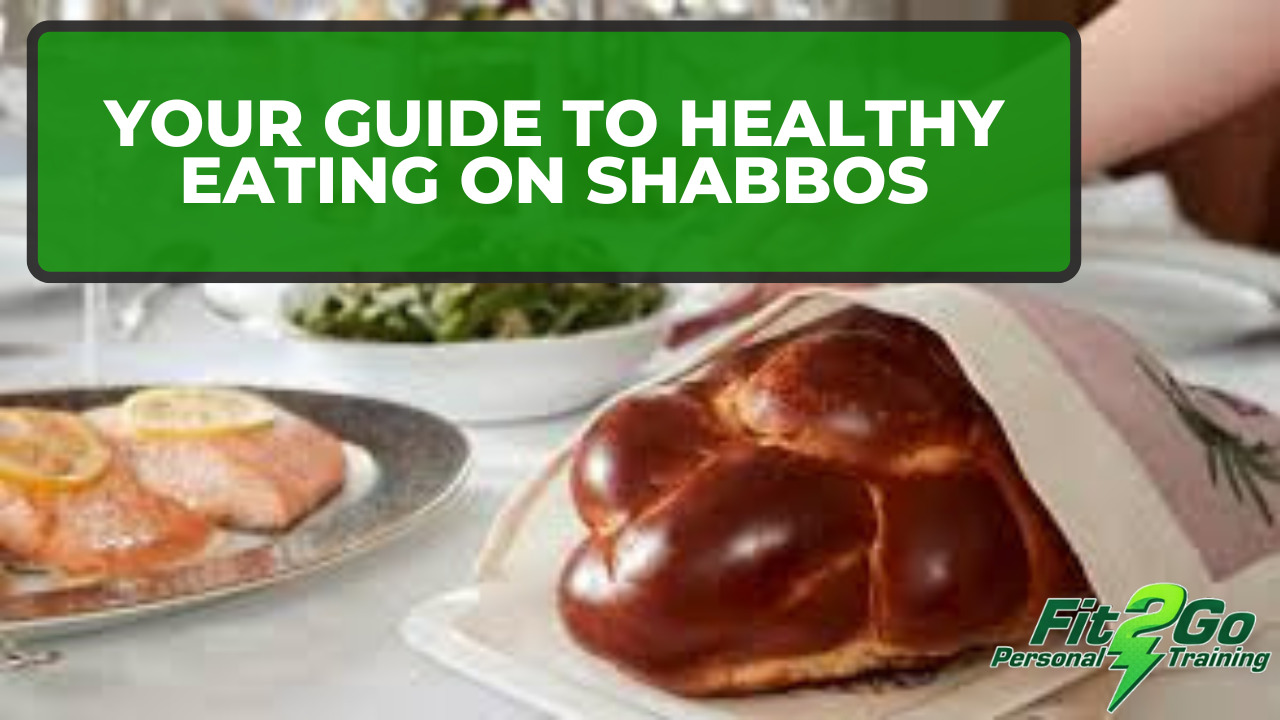
02 Apr Your Guide to Healthy Eating on Shabbos
It’s Friday afternoon.
The house is a whirlwind of activity—last-minute cooking, setting the table, rushing to get the kids bathed and dressed. The smell of freshly baked challah fills the air. Finally, candle lighting. A deep breath. You made it.
You sit down at the beautifully set table, surrounded by family, exhaling for what feels like the first time all week. And in front of you? The most comforting spread of food—soft challah, steaming chicken soup, kugels, dips, desserts. After a long week, the thought of indulging without a second thought feels deserved.
And then—before you know it—you’re uncomfortably full, sluggish, and telling yourself, next week, I’ll do better.
If this sounds familiar, you’re not alone. Many of my clients struggle with balancing Shabbos enjoyment with their health goals. The good news? You don’t have to choose one or the other. Here’s how:
Simple Strategies for a Healthier Shabbos
✅ Start with Protein & Veggies
Fill up on fish, chicken, or meat with a side of salad after one piece of challah. Protein helps keep you full longer and prevents sugar crashes later.
➡ Client story: Rivky used to eat multiple slices of challah right away and felt bloated before the soup even arrived. Now, she starts with protein first, has one small piece of challah, and feels so much better without feeling deprived.
✅ Mind Your Portions
Use a smaller plate, take a little of each dish, and check in with your hunger before going for seconds. Shabbos food is delicious—but it’s always there next week!
➡ Personal story: I used to go back for kugel automatically just because it was there. When I started plating a balanced portion instead of grazing, I noticed I felt satisfied without the post-meal slump.
✅ Be Mindful with Challah
Instead of multiple slices, try one small piece and truly savor it. If you love dips, pick one or two favorites instead of loading your plate with everything.
➡ Client story: Sarah struggled with mindlessly tearing off pieces of challah throughout the meal. We set a plan: one slice at the beginning and then pausing to ask herself if she really wanted more. Now, she enjoys her challah without feeling out of control.
✅ Stay Hydrated
Sometimes, we mistake thirst for hunger. Try drinking a full glass of water before the meal and sipping between courses. This can help prevent overeating.
✅ Enjoy the Treats—But in Moderation
You don’t have to say no to kugel, cholent, or dessert—just be intentional. Choose your favorite, take a reasonable portion, and savor every bite instead of eating on autopilot.
➡ Client story: Tova felt like she had to eat every dish at the table because it was Shabbos. But when she started picking just the foods she really loved, she found she didn’t miss the extra calories.
✅ Take a Walk
If possible, go for a post-meal stroll. It helps with digestion and keeps you active. Even five minutes around the block makes a difference!
✅ Navigating Social Pressure Around Food
One of the biggest challenges I hear from clients is feeling obligated to eat foods they don’t really want—especially when they’re guests at someone else’s house. Whether it’s a host pushing dessert, a mother-in-law insisting you must try her kugel, or just the feeling that “everyone else is eating, so I should too,” it’s tough to say no.
Here’s how to handle it:
�� Use the “Try and Compliment” Strategy – Take a small bite, compliment the dish, and move on. Most people just want their food to be appreciated—not necessarily eaten in large amounts.
�� Blame Fullness – A simple “Everything was so delicious, I’m totally full right now” works wonders. Hard for anyone to argue with that!
�� Hold a Drink – Having a glass of water or tea in your hand makes it easier to avoid extra food without feeling awkward.
�� Redirect the Conversation – If someone pushes food, shift the topic. A warm smile and a quick “It looks amazing! By the way, how was your week?” can do the trick.
➡ Client story: Devorah felt so guilty turning down desserts at her in-laws’ every week. We practiced simple ways to say no while keeping things light. Now, she enjoys what she chooses and no longer leaves feeling overstuffed out of guilt.
Shabbos should be about connection and enjoyment—not pressure to eat just to please others. You can be polite and stick to your goals!
NOW….
Imagine sitting down at the Shabbos table relaxed, knowing you can enjoy the food without feeling overstuffed. Imagine waking up Shabbos morning feeling light, energized, and ready for the day instead of sluggish.
These small changes aren’t just about weight loss. They’re about feeling good in your body, having more energy for your family, and showing up for yourself every single week.
I’ve helped so many women find balance with Shabbos eating—without giving up the foods they love. You can do it, too.
Wishing you a restful and healthy Shabbos,
-Coach Shani
Shani helps women lose fat, build strength, and improve their confidence by making fitness practical.
Currently, Shani is available in-home personal training in Baltimore, MD and virtual personal training everywhere.
Want to discuss starting your own Fit2Go program?
Schedule your free consultation to get started.


